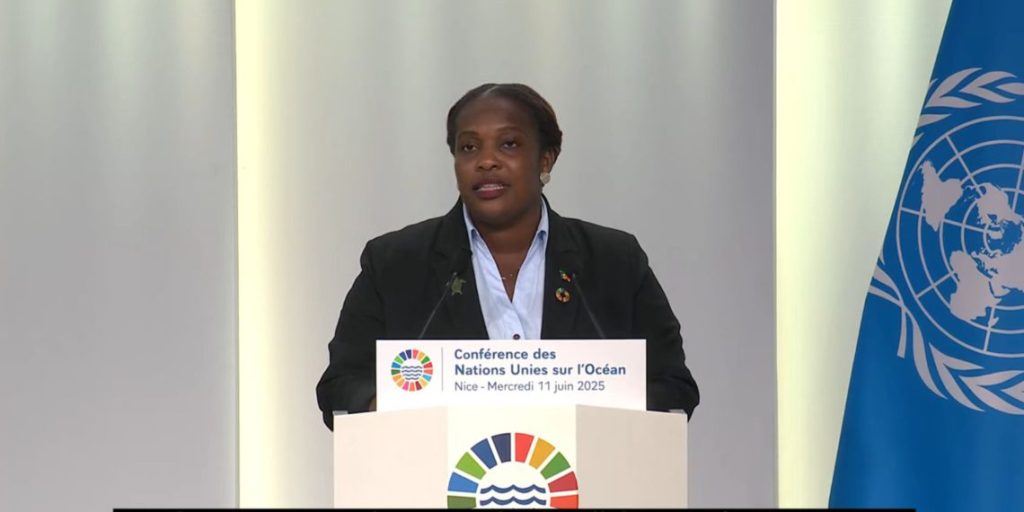Hon. Clarke Addresses UN Ocean Summit with Powerful Statement on Small Island Developing States
The plight of Small Island Developing States (SIDS) in the face of the escalating climate crisis took center stage at the 2025 United Nations Ocean Conference (UNOC) in Nice, France. Dr. Joyelle Clarke, Minister of Sustainable Development for Saint Kitts and Nevis, delivered a powerful address that underscored the existential threats facing these vulnerable nations and called for urgent, concerted global action. Her message resonated with the conference theme, emphasizing that the ocean, the lifeblood of SIDS, is facing unprecedented risks due to unchecked greenhouse gas emissions. For nations like Saint Kitts and Nevis, the ocean isn’t merely a resource; it’s fundamental to their identity, sustenance, and very existence. Minister Clarke’s plea was a stark reminder that inaction on climate change translates directly into the loss of livelihoods, cultural heritage, and even entire nations.
Dr. Clarke’s address focused on three critical priorities: securing adequate ocean finance, advancing ocean science, and strengthening global ocean governance. She argued that failure on any of these fronts would represent a betrayal of the over two billion coastal inhabitants worldwide who are grappling with the daily realities of sea-level rise, biodiversity loss, and plastic pollution. The minister emphasized that SIDS bear a disproportionate burden from these climate-driven challenges, despite contributing minimally to the problem. Survival, she stressed, is largely dependent on the actions of larger, more industrialized nations, highlighting the urgent need for international cooperation and shared responsibility. This call for global solidarity underscored the interconnectedness of the climate crisis and the need for collective action to protect the most vulnerable.
Minister Clarke’s address wasn’t merely a plea for assistance; it was a call to action backed by concrete proposals. She advocated for science-based ocean policies, the scaling up of nature-based solutions, swift ratification of the Biodiversity Beyond National Jurisdiction (BBNJ) Agreement, and the rapid conclusion of the Plastic Pollution Treaty. Recognizing the need for greater financial support, she called for amplified and more predictable ocean financing mechanisms tailored to the unique needs of SIDS. Furthermore, she championed urgent reforms in international law to address the pressing issue of sea-level rise. These reforms, she argued, are crucial to protect the sovereignty and very existence of vulnerable coastal states, ensuring their people’s fundamental right to exist is not threatened by rising tides.
Critically, Dr. Clarke challenged the existing global climate finance architecture, labeling it insufficient, unpredictable, and detached from the realities facing SIDS. She advocated for localized solutions, increased local autonomy, and community-led coordination to ensure that climate finance effectively addresses the specific vulnerabilities of island nations. Highlighting the immediacy of the climate crisis for Saint Kitts and Nevis, she underscored that its impacts are not abstract but lived experiences. This served to emphasize the urgent need for action, not just promises, from the international community. The minister’s words painted a vivid picture of the daily struggles facing SIDS, effectively humanizing the climate crisis and reinforcing the moral imperative to act.
Dr. Clarke’s presentation also showcased Saint Kitts and Nevis’ commitment to climate action. She outlined the nation’s ambitious Sustainable Island State Agenda (SISA), which aims to transform the country into a fully sustainable island state by 2040. This ambitious goal underscores the nation’s commitment to leading by example. She highlighted concrete actions already underway, including a national ban on single-use plastics, the enactment of plastic waste reduction legislation, and innovative partnerships with local academic institutions and NGOs. These initiatives, she noted, are crucial components of the country’s comprehensive approach to building resilience and transitioning towards a sustainable future. This proactive approach positions Saint Kitts and Nevis as a model for other SIDS, demonstrating that even the smallest nations can make significant strides towards sustainability.
In her concluding remarks, Minister Clarke reaffirmed Saint Kitts and Nevis’ alignment with AOSIS and the IUCN, signifying the nation’s commitment to multilateral cooperation in addressing climate change. Her powerful address effectively positioned Saint Kitts and Nevis as a strong advocate for SIDS within the global arena, amplifying their voice on the world stage and demanding attention to their unique vulnerabilities and needs. The minister’s words resonated not only as a plea for survival but as a call for justice, equity, and shared responsibility in tackling the defining challenge of our time. Her call to action served as a reminder that the fate of SIDS is inextricably linked to the future of the planet, and that urgent action is required to ensure a sustainable future for all.
Share this content:












Post Comment